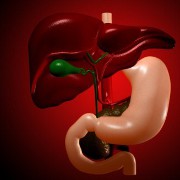 Photo: Getty Images
Photo: Getty Images
According to the National Cancer Institute, more than 9,250 cases of gallbladder cancer will be diagnosed this year and more than 3,300 people will die from this deadly disease.
Your gallbladder is approximately three to four inches long and one inch wide. Think of it as the shape of a small pear. Your gallbladder store and collects bile. Most people live healthy lives if their gallbladder is removed.
The American Cancer Society website stated ʺabout nine out of ten gallbladder cancers are adenocarcinomas. An adenocarcinoma is a cancer that starts in the cells with gland-like properties that line many internal and external surfaces of the body (including the inside the digestive system).ʺ
Papillary adenocarcinoma or papillary cancer is another form of gallbadder cancer. ʺAbout six percent of all gallbladder cancers are papillary adenocarcinomas. They tend to have a better prognosis (outlook) than most other kinds of gallbladder adenocarcinomas,ʺ said the American Cancer Society.
Other types of gallbladder cancer include:
· Sarcomas (but these are uncommon)
· Carcinomas
· Small cell carcinomas
· Squamous cell carcinomas
The National Cancer Institute stated, ʺGallbladder cancer begins in the innermost layer of tissue and spreads through the outer layers as it grows.ʺ
There are several risk factors for gallbladder cancer. Those risks according the American Cancer Society include:
· Female gender. Gallbladder cancer occurs in women twice as much as men.
· Race. Mexican Americans and Native Americans have the highest rate of gallbladder cancer.
· Gallstones
· Porcelain gallbladder
· Obesity
· Age. Three out of four people are older than 65 when they are diagnosed with gallbladder cancer. The median age of diagnosis is 73.
· Choledochal cysts
· Abnormalities of the bile ducts
· Gallbladder polyps
· Typhoid
· Family history
According the American Cancer Society, industrial and environmental chemicals may also be a risk for gallbladder cancer. ʺSome studies in lab animals have suggested that chemical compounds called nitrosamines may increase the risk of gallbladder cancer. Other studies have found that workers in the rubber and textile industries may have more gallbladder cancers than the general public. More research is needed in this area to confirm or refute these possible links,ʺ said the American Cancer Society’s website.
Gallbladder cancer symptoms include:
· Jaundice
· Abdominal pain
· Gallbladder enlargement
· Nausea and/or vomiting
· Loss of appetite
· Weight loss
· Abdominal swelling
· Severe itching
· Black, tarry bowel movements
You are generally diagnosed with gallbladder cancer after your gallbladder is removed by surgery. A pathologist will analyze your gallbladder for cancer cells and your doctor will confirm the diagnosis. Treatment for gallbladder cancer includes radiation therapy, chemotherapy and palliative therapy.
References:
What are the risk factors for gallbladder cancer? American Cancer Society: Information and Resources for Cancer: Breast, Colon, Prostate, Lung and Other Forms. Retrieved December 12, 2011, from http://www.cancer.org/Cancer/GallbladderCancer/DetailedGuide/gallbladder-risk-factors.
Gallbladder Cancer Home Page - National Cancer Institute. Comprehensive Cancer Information - National Cancer Institute. Retrieved December 12, 2011, from http://www.cancer.gov/cancertopics/types/gallbladder.
Gallbladder Cancer Treatment - National Cancer Institute. Comprehensive Cancer Information - National Cancer Institute. Retrieved December 12, 2011, from http://www.cancer.gov/cancertopics/pdq/treatment/gallbladder/Patient.
Detailed Guide. American Cancer Society: Information and Resources for Cancer: Breast, Colon, Prostate, Lung and Other Forms. Retrieved December 12, 2011, from
http://www.cancer.org/Cancer/GallbladderCancer/DetailedGuide/index.
Reviewed December 12, 2011
by Michele Blacksberg RN
Edited by Jody Smith




Add a CommentComments
There are no comments yet. Be the first one and get the conversation started!